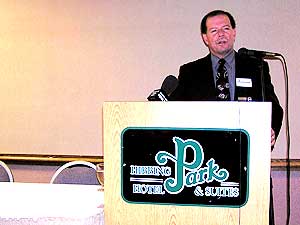|
Audio
Photos
More from MPR
Resources
Your Voice
|
Six months into JOBZ, there's mixed news
August 19, 2004
JOBZ, the state's new rural economic initiative, is surprising the experts. It's drawing great interest from businesses in some parts of the state. Still, most of the state's JOBZ zones are still waiting for their first business application, according to a six-month review of the program, which was released Wednesday.
Hibbing, Minn. — Businesses opening shop in JOBZ zones are promising to keep about 1,000 jobs in rural Minnesota, and to create another 1,000. By the end of June, there were 64 businesses opening, re-locating, or expanding into the zones among 46 rural communities. Still, the offer of tax free property for 12 years is only one factor for the businesses, according to Bob Isaacson with the Department of Employment and Economic Development.
"What we found is, without JOBZ, many of them would have located somewhere else, or invested a lower level," Isaacson says.
Most businesses would have located somewhere else in Minnesota, while others were looking at other states and overseas. But, Isaacson says, in many cases the businesses would not have invested as much as they did with the JOBZ tax breaks.
The six-month report is by the Center for Rural Policy and Development. Center President Jack Geller says the majority of businesses going into the zones do appear to be the kind legislators intended.
"These are primarily manufacturing firms and machining firms, and the kinds of primary industries that produce goods and services to be sold outside of the market, to grow the economic pie," says Geller.
|
There is interest in this program. You cannot deny it. Businesses are calling. They're making applications. There is a substantial amount of interest going on in the business community.
- Jack Geller |
Sixty percent of the businesses can be considered manufacturing. Another 25 percent are in the services and transportation sectors, and about 8 percent are wholesale or distribution businesses. The report says the average wage for employees is just over $12 an hour.
Among the businesses, most -- about 42 percent -- are local businesses that have expanded into a JOBZ zone. Almost 25 percent are new startup businesses. But, Geller says, some are local businesses that relocated from a taxpaying property into the tax-free zones.
"The 17 percent local relocations is somewhat troubling," Geller says. "And we're going to have to go and look at those companies and try to get a sense what exactly is going on."
There could be some troubling implications.
"Some people would argue that local relocations are basically moving deck chairs," says Geller.
One JOBZ sub-zone has already drawn three businesses. But among more than 300 sub-zones, more than three-fourths have yet to see their first application.
Much of the JOBZ success has been in the southern tier of Minnesota counties. Quality Pork Producers of Austin, Minnesota, is one such case. The company is planning a new packing plant in Albert Lea, just north of the Iowa border. Company spokesman Kelly Wadding says JOBZ probably kept his plant from moving to Mason City or Clear Lake, Iowa.
"I think this would have happened. We would have found a facility, we would have expanded," says Wadding. "When, I don't know. It helped up move up the timeline. Helped us get this thing kicked in gear a lot faster." Mark Steele, who owns a company in St. Peter, Minnesota, says JOBZ helped him free up cash to run his business. Steele owns Exceed Packaging in St. Peter. Property taxes would have been another expense, sapping his businesses cash.
"You have to pay employees for several months or a year, and pay your electric bill and your gas bill," says Steele. "You have all these expenses that you have to cover until that business has a chance to get going. And that money is not readily available. Period."
Report authors admit it's too early to measure the cost of JOBZ. Eventually, a community's gains through payroll and spinoffs will have to be measured against losses, like property tax revenue. But Jack Geller says so far, the program's working.
"There is interest in this program," Geller says. "You cannot deny it. Businesses are calling. They're making applications. There is a substantial amount of interest going on in the business community."
The Center's JOBZ forum precedes a two-day Minnesota Rural Summit being held Thursday and Friday in Hibbing.
|
News Headlines
|
Related Subjects
|

